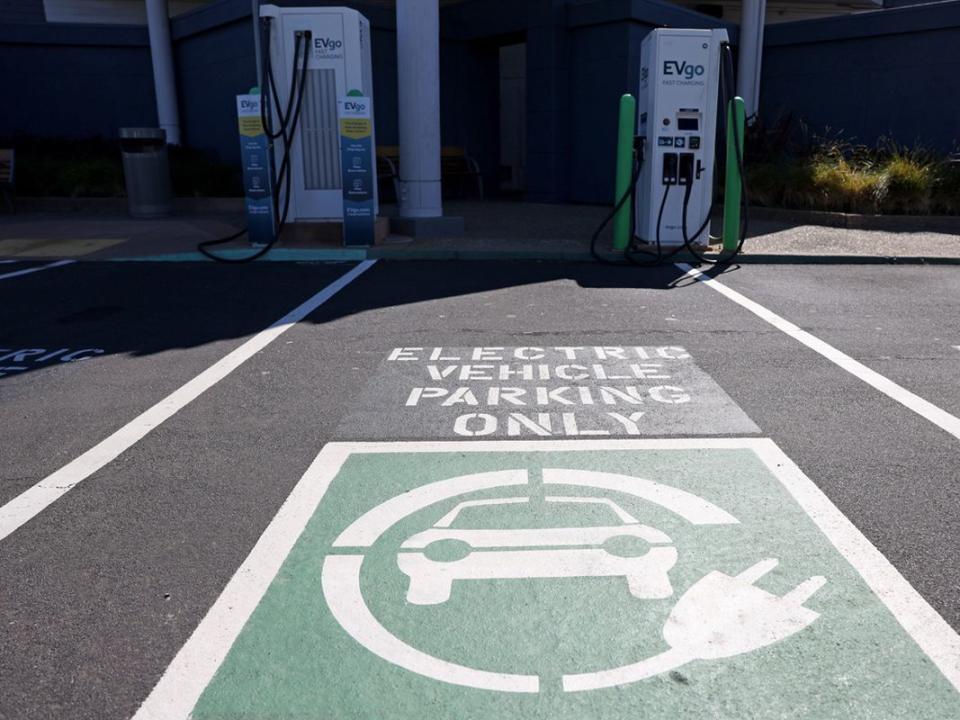William Watson: Keep Ottawa out of the charging-station business

New word for me for 2024: bobtail. A verb known to truckers everywhere, I assume, meaning to operate the cab of an 18-wheeler without the trailer. Comes from the tail trim or tie given horses to keep their rear appendages from interfering with the driver of the wagon or sleigh they’re pulling. Hence: bells on bobtails ring, making spirits bright. Or: I bet my money on the bobtail nag, somebody bet on the bay.
I wonder if bobtail, the verb, will be 2024 word of the year. I learned it in a Wall Street Journal article last week about a California trucking company trying to adjust to that state’s new electric truck mandate, which requires that any new trucks registered in California be hydrogen or electric.
Journal reporter Sierra Dawn McClain accompanied a trucker in one of his company’s new electric trucks. They ride smooth and quiet but can’t carry the heaviest loads and take 60 to 90 minutes to charge. And because many charging stations are in shopping centres where semis don’t easily fit, the driver often has to detach the trailer and bobtail it to the station. While he waits for his rig to charge, the driver Ms. McClain accompanied eats lunch, watches Netflix or scrolls social media. In a diesel rig he typically completes six short hauls in a day. The day the Journal reported on he completed just two. Filling up his diesel rig takes 15 minutes and lets him drive 1,000 miles. That distance in the E-truck requires “six recharging stops of at least 90 minutes each.”
Time spent charging, searching for chargers, or maneuvering to get in beside a charger is time spent not hauling freight. Workers who haul less get paid less. If unions, labour laws or “Canadian values” mean wages can’t go down, prices go up. If goods cost more to haul, consumers will pay more for goods. If you’re among the one per cent of Canadians who give a hoot about productivity statistics, it means productivity declines. Again.
How hard it is to find charging stations has been a theme in a number of CBC stories about EVs lately. One poor fellow in Toronto leaves his car at the nearest public station, walks 19 minutes home — his having timed it obviously means it’s a sore point — then picks it up next morning. Seeing this, most viewers will think: Hmm, that EV I was thinking of buying may prove more bother than it’s worth.
But if you’re the self-appointed national climate-change broadcaster, your take is a little different: we need a big policy push to get charging stations on every street corner or high-rise garage space. One Toronto developer who is doing exactly that in a new building said, “It’s win-win.” It’s good for the environment and it encourages future owners or renters to buy EVs. OK, but it adds $10 million to the cost of the building, so it’s actually: win-win-pay. Somebody picks up that cost.
If developers decide giving every parking spot its own plug — with “free” electricity, too? — is a good way to attract buyers or renters, well, more power to them (so long as they pay for that power). But if the idea is that governments mandate that all new buildings provide plugs for every parking spot — assuming buildings can still offer parking spots, not just bike lockers — that’s quite another thing: government-forced purchase with the cost bundled into the price of the condo or apartment. (No, Virginia, developers don’t pay for plugs or power out of their own pockets.)
There’s also no shortage of people arguing that the government should simply provide charging stations directly. In this society, “we need more charging stations” carries the implicit follow-through: so government should provide them, just the way government should provide everything else we want but would rather not pay for.
Two things about that. One, you may have noticed our governments aren’t actually very good at providing things, whether we’re talking passports, jet fighters, functional submarines, health care or pothole-free streets. You pretty much name it and they can’t provide it. Not to mention that they’ve just committed to providing lots more housing. Once you’ve finished dealing with your federal real estate agent, ask about a charging station for your new abode, on which you can expect delivery in, oh, about 2040. The abode, that is. The charging station, maybe five years after that.
But, two, we don’t actually want the government providing charging stations. When I fill up at a gas station what I pay covers the cost of the whole operation, gas and station. We want people getting into the charging-station business only if consumers pay enough that they can cover their costs, profit included. If they can’t cover their costs, we don’t actually want resources flowing to that purpose.
But what about the external benefit to “society” from making it easier for people to drive EVs? That’s what the carbon tax is for. If you get the carbon tax right, that external benefit is already baked into gas prices. After you’ve done that, you let markets rip and if they produce a charging station in every pot, fine. But if they don’t, that’s fine, too.
Bookmark our website and support our journalism: Don’t miss the business news you need to know — add financialpost.com to your bookmarks and sign up for our newsletters here.

 Yahoo Finance
Yahoo Finance 